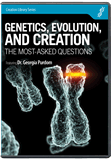
Molecular Clock Off-Line
The molecular clock just went off-line.
News Source
- Science News: “Human Mutation Rate Slower than Thought”
The first direct measurement of human mutation rates ever done, published in Nature Genetics, contains surprises which call molecular clock assumptions into question and prompt some re-thinking of our genetic understanding. Analysis of data from two families in the “1000 Genomes Project” database suggests that humans mutate much more slowly than predicted and in surprisingly unpredictable and inconsistent ways.
In each case, the genomes of one child and his/her parents were analyzed. The first challenge was to determine which genomic differences represented mutations and then which of those were inherited. Only mutations in the parents’ germ cells can be inherited. While about 1600 non-germline mutations were found, only 49 mutations were inherited by one child and only 35 by the other.1 Other studies confirmed an average of around 30 to 50 mutations passed on per child.
Human mutation rates have previously been estimated by assuming that humans and chimps evolved from a common ancestor on an evolutionary timescale of millions of years. Human-chimp differences are analyzed to decide which differences represent presumed mutations. Finally, by calculating how many mutations it takes to make a person, the rate of mutation within the evolutionary time frame is determined. Thus the molecular clock is a figment of evolutionary imagination. And this new data suggests that the clock’s estimates are about three times too fast. Hanging onto the notion of a common ancestor, study co-leader Dr. Philip Awadalla says, “In principle, evolution is happening a third as slowly as previously thought.”2
The surprises don’t end there. Genetic dogma has held that fathers, because they continually manufacture sperm, should pass on mutations much faster than mothers. This phenomenon is called male mutation bias. However, while one child inherited the expected 92% of its mutations from the father, the other only received 36% from its father. While the researchers still maintain that males generally produce more germ cell mutations per generation than women, Awadalla now adds that “the mutation rate can be extraordinarily variable from individual to individual.”
The dramatic variability of human mutation rates also increases the danger of misdiagnosis of genetic diseases. As Dr. Awadalla says, “The variation in mutation rates that we observed is of potential clinical importance, as it suggests that the risk of misdiagnosing a [de novo mutation] as being pathogenic could vary substantially between individuals.”3
Additional studies of many family genomes will be needed to confirm this data and answer additional questions. For instance, were these mutations sporadic occurrences in the germ cells of the parents or did they exist in all of the germ cell lines? Only analyses of multiple offspring can provide data for those kinds of calculations. Furthermore, why do people mutate at such different rates? Do they have inherently different abilities to repair their own mutations? Does the environment or the age of the parent play a role? Human obstetrical data show that the age of the mother’s ova is significant. But what about the mutation rate of the father?
Notice that worldview bias influences interpretations of the basic facts. The facts reported here show that humans mutate more slowly than previously thought. The evolutionary worldview assumes that the common ancestor must therefore be pushed back further into the past.
Future investigations should prove instructive. Yet notice that worldview bias influences interpretations of the basic facts. The facts reported here show that humans mutate more slowly than previously thought. The evolutionary worldview assumes that the common ancestor must therefore be pushed back further into the past. The creationist worldview, not accepting that a common ancestor ever existed, is not surprised that a molecular clock calibrated by evolutionary assumptions cannot be trusted.
Further Reading
For More Information: Get Answers
Remember, if you see a news story that might merit some attention, let us know about it! (Note: if the story originates from the Associated Press, FOX News, MSNBC, the New York Times, or another major national media outlet, we will most likely have already heard about it.) And thanks to all of our readers who have submitted great news tips to us. If you didn’t catch all the latest News to Know, why not take a look to see what you’ve missed?
(Please note that links will take you directly to the source. Answers in Genesis is not responsible for content on the websites to which we refer. For more information, please see our Privacy Policy.)
Footnotes
Recommended Resources

Answers in Genesis is an apologetics ministry, dedicated to helping Christians defend their faith and proclaim the good news of Jesus Christ.
- Customer Service 800.778.3390
- © 2024 Answers in Genesis



